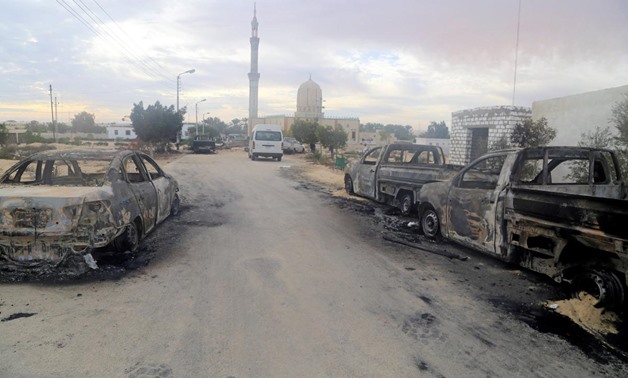
Damaged vehicles are seen after a bomb exploded at Al Rawdah mosque in Bir Al-Abed, Egypt November 25, 2017. REUTERS/Mohamed Soliman
CAIRO - 30 July 2019: The U.S. Department of Justice announced on Monday that two Somalis were arrested in the airport of Arizona’s Tucson city on July 26 after they had checked-in as they were departing to Egypt’s North Sinai to join the Islamic State, as reported by Fox News.
The defendants are Ahmed Mahad Mohamed, 21, and Abdi Yemani Hussein, 20, who entered the United States as refugees. The former had been granted a permanent residence status, while the latter was still in the U.S. under refugee status. Both had planned to carry out a terror attack in the U.S., if they failed to travel.
U.S. President Donald Trump tweeted on Tuesday about the news saying that the case was cracked by an undercover agent who pretended to be a terrorist and that one of them said, “The best wake up call is Islamic State to get victory or another 9/11.”
North Sinai has been experiencing a terrorism wave since February 2011 when a gas exporting pipeline was bombed. The attack took place right after the outbreak of the January 25 Revolution and before the resignation of former President Hosni Mubarak. That was also in parallel to the border infiltration by Hamas and Hezbollah elements who stormed into prisons where members of the outlawed Muslim Brotherhood were jailed. Among those who escaped was former President Mohamed Morsi, who was a member of the Supreme Guide Bureau.
In April 2012, the gas pipelines had been bombed for a 14th time which incurred an arbitration case with Israel. Through a settlement in 2016, the compensation value was reduced to $500 million from $1.7 billion. In May 2012, seven soldiers had been abducted in North Sinai for seven days before they were freed by Egyptian security forces. A month later, 16 soldiers were assassinated in heavy shooting in the border town of Rafah. The attack is dubbed “1st Rafah Massacre.”
The terror attacks reached their peak in Egypt in the aftermath of the ouster of Morsi on July 3, 2013 over mass protests that began on June 30 of the same year. The attacks targeted mainly churches, buildings of security directorates, security checkpoints, ambushes, and patrols causing hundreds of deaths, injuries, and material losses across the country. At present, terrorism is predominantly confined to North Sinai. Many terror attacks have been launched in the name of Ansar Beit Al Maqdes which has pledged allegiance to the Islamic State in 2014 along with its rise in Syria and Iraq.
The most prominent attack targeted at civilians in was that against Rawda Mosque where 305 were killed, including 27 children, and 128 people were injured. Investigations revealed that gunmen whose number varied between 25 and 25 carrying the IS flag used automatic rifles to kill the worshippers as they took up positions in front of the mosque door and its 12 windows.

Comments
Leave a Comment